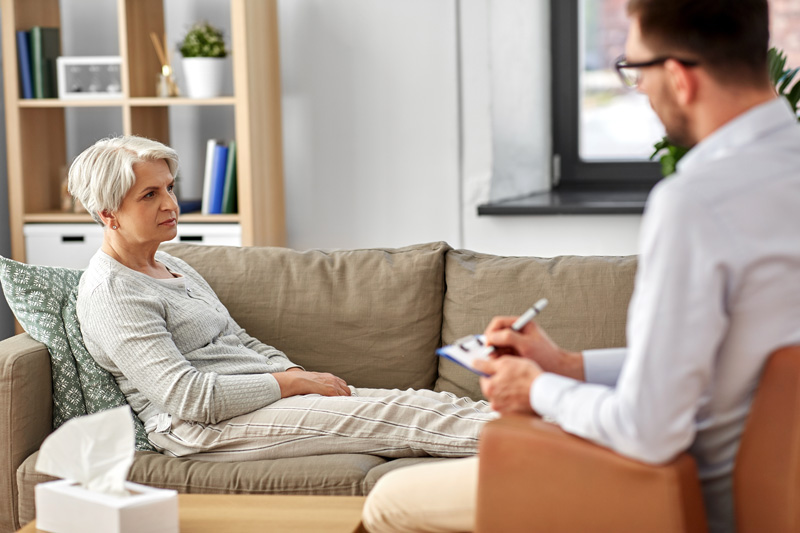There are many changes that take place as we age, but many people assume that depression is a normal part of aging. Instead, depression is best thought of as a response to losses and changes associated with aging, and most importantly – it is treatable! In our work with community-dwelling older adults, between 10-25% of individuals presented clinically significant depressive symptoms (Raue et al., 2019; Sirey et al., 2020). In New York City, these numbers are higher, with 25% of senior center members reporting clinically significant depression measured with the PHQ-9 (Sirey et al., 2023). Yet older adults are less likely to seek professional help, and often, depression goes untreated (Elshaikh et al., 2023). We have seen both concerns about medications offered by primary care physicians and stigma related to mental health keeping people from accessing care. Sometimes, older adults are concerned about the views of others (family, friends, communities) who they worry may think less of them if they seek care. This stigma and the lack of knowledge about easily accessible resources make it challenging to provide appropriate care (Sirey et al., 2014). To address these barriers, our group at Weill Cornell Medicine has focused on developing therapies that are easy to access, brief and focused, and, in the case of research – often free to individuals who meet the criteria.

Our team at Weill Cornell Medicine has been conducting research funded by the National Institute of Mental Health (NIMH) on community-based interventions since 1990. With a transdisciplinary scientific approach to therapies for depression among older adults, we create interventions, methods, and evaluation strategies to improve depression interventions for underserved and hard-to-reach older adults in community settings and promote intervention sustainability. For this purpose, we work closely with community providers to offer information about our services and facilitate referrals. In addition, all of our mental health programs include tracking of symptoms to ensure that the therapy is effective. This evidence-based framework is critical to all of the therapy programs for older adults we offer. In this article, we illustrate our approach to the delivery of care by describing a current research project to offer specialized and innovative care for older adults – “Do More, Feel Better.”
Do More, Feel Better
With our colleagues in Seattle and Tampa, we developed “Do More Feel Better” to be offered to community-dwelling older adults who are depressed. This program offers a brief therapy called Behavioral Activation (BA), which is delivered by either a social worker or a trained lay volunteer to adults 60 years and older with sad moods or lack of enjoyment in usual activities. It is designed to expand the workforce of individuals who can offer care to older adults (Raue et al., 2022). BA therapy is a straightforward evidence-based intervention based on the principle that depression arises from a chronic reduction of positively reinforcing events that further leads to a withdrawal from usual and pleasurable activities, creating a downward spiral with fewer opportunities to experience positive events (Dimidjian et al., 2019; Raue et al., 2019). BA is easy to learn and easy for clients to follow and has shown effectiveness among older adults (Cernin & Lichtenberg, 2009; Chartier & Provencher, 2013). During nine weekly individual meetings, clients work with their providers to identify and plan pleasurable activities, reducing their depressive symptoms. All services are delivered remotely, allowing for maximum flexibility.
Lay volunteers have traditionally been a resource for community agencies and senior centers and have been shown to successfully deliver brief mental health interventions (Choi et al., 2020; Raue et al., 2019). “Do More Feel Better” was designed to tap into the large resource of older adults who serve as volunteers across the national aging network (Aging, 2023) and contribute to the access and sustainability of mental health programs for older adults (Raue et al., 2022). In “Do More, Feel Better,” we use a simplified BA treatment and train lay volunteers who are 60 years or older from the community to become “peer coaches” and deliver nine weeks of treatment to depressed older adults. Lay volunteers go through a rigorous certification process that involves four training sessions as well as weekly clinical supervision to help maintain fidelity to the intervention.
Given the large number of monolingual Spanish-speaking older adults in the US, we expanded our “Do More, Feel Better” project to serve this population. Spanish is the primary language for 21% of older adults living in New York City, and almost 14% have Limited English Proficiency (LEP) (Aging, 2023). Further, Hispanic older Americans have been shown to experience depressive symptoms at higher rates compared to non-Hispanic white American older adults (Hooker et al., 2019). Recognizing the need for and lack of care as well as potential limitations posed by language barriers, we expanded our program to give older Spanish speaker adults the opportunity to participate in research and receive BA therapy in Spanish. We have worked with multiple senior and community centers in the New York City area serving the Hispanic population to bring awareness of mental health needs, contribute to destigmatizing late-life depression, and present our project as an available resource.
Striving to develop a workforce of nontraditional providers, “Do More Feel Better” has high potential for sustainability by making use of the existing national volunteer resources: according to a recent New York State Aging report, there are nearly one million volunteers aged 55 and older in New York State providing over 495 million hours of service at an economic value of $13.8 billion annually (NYSOFA, 2023). As the next step, we will be launching a program to sustain the “Do More, Feel Better” at senior centers. Senior centers will take over the training of volunteer coaches and oversight of the program.
Since the launching of the program in 2020, all participants, from the peer coaches to the clinicians and especially the clients, have reported positive experiences. Across three cities, New York City, Tampa, Florida, and Seattle, Washington, 52 peer coaches have been trained, and more than 244 participants served. Fidelity to treatment from peer coaches and clinicians has been maintained, and participants have reported an increase in their daily activities and enjoyment of the program (Gum & Raue, 2023).
Final Remarks
Older adults are at risk of experiencing mental health distress that can lead to poor health outcomes and a significant reduction in quality of life (Jia & Lubetkin, 2017). Stressful life events such as exposure to crime and increasing social isolation and loneliness among older adults have been shown to have dramatic effects on their mental well-being (HHS, 2023). “Do More, Feel Better” seeks to address the mental health needs of community-dwelling older adults by implementing a community-based approach to the delivery of BA Therapy and increasing the potential for sustainability by utilizing the existing older adult volunteer network. “Do More, Feel Better” participants have reported positive experiences in the program, including trained lay volunteers who further experience reward from learning to deliver an evidence-based intervention and help their peers (Gum et al., 2023). The lack of available and scalable evidence-based interventions for this population led our teams’ efforts to develop innovative programs to address the unmet needs of depressed older adults. Collaboration with National and Federal agencies is fundamental to continue to address this mental health concern.
If you want to learn more about our community-based research and mental health programs for older adults, please visit sireylab.weill.cornell.edu. You can email us at SireyLab@med.cornell.edu or call at 914-682-5453. Interested in learning more about “Do More, Feel Better”? Contact us at 914-507-7672.
References
Sirey, J. A., Rollandi, I., Fiallo, O., Serenshine, K. (2023). Bringing Mental Health Services to Diverse Older Adults in New York City [Conference Presentation]. AAGP 2023 Congress, New Orleans, LA, United States. aagponline.org/wp-content/uploads/2023/03/Raue.Sirey-Bringing-Mental-Health-March4.pdf
Raue, P. J., Sirey, J. A., Dawson, A., Berman, J., & Bruce, M. L. (2019). Lay-delivered behavioral activation for depressed senior center clients: Pilot RCT. International journal of geriatric psychiatry, 34(11), 1715–1723. doi.org/10.1002/gps.5186
Sirey, J. A., Woods, A., Solomonov, N., Evans, L., Banerjee, S., Zanotti, P., Alexopoulos, G., & Kales, H. C. (2020). Treatment Adequacy and Adherence as Predictors of Depression Response in Primary Care. The American journal of geriatric psychiatry: official journal of the American Association for Geriatric Psychiatry, 28(11), 1164–1171. doi.org/10.1016/j.jagp.2020.04.014
Elshaikh, U., Sheik, R., Saeed, R. K. M., Chivese, T., & Alsayed Hassan, D. (2023). Barriers and facilitators of older adults for professional mental health help-seeking: a systematic review. BMC geriatrics, 23(1), 516. doi.org/10.1186/s12877-023-04229-x
Sirey, J. A., Franklin, A. J., McKenzie, S. E., Ghosh, S., & Raue, P. J. (2014). Race, stigma, and mental health referrals among clients of aging services who screened positive for depression. Psychiatric services (Washington, DC), 65(4), 537–540. doi.org/10.1176/appi.ps.201200530
Raue, P. J., Sirey, J. A., Gum, A., Hawrilenko, M., & Fisher, D. M. (2022). Protocol for a collaborative randomized effectiveness trial of lay-delivered versus clinician-delivered behavioral activation in senior centers. BMJ open, 12(8), e066497. doi.org/10.1136/bmjopen-2022-066497
Dimidjian, S., Barrera, M., Jr, Martell, C., Muñoz, R. F., & Lewinsohn, P. M. (2011). The origins and current status of behavioral activation treatments for depression. Annual review of clinical psychology, 7, 1–38. doi.org/10.1146/annurev-clinpsy-032210-104535
Cernin, P. A., & Lichtenberg, P. A. (2009). Behavioral Treatment for Depressed Mood: A Pleasant Events Intervention for Seniors Residing in Assisted Living. Clinical Gerontologist, 32(3), 324–331. doi.org/10.1080/07317110902896547
Chartier IS, & Provencher MD (2013). Behavioural activation for depression: Efficacy, effectiveness and dissemination. Journal Of Affective Disorders, 145(3), 292–299. doi.org/10.1016/j.jad.2012.07.023
Choi, N. G., Marti, C. N., Wilson, N. L., Chen, G. J., Sirrianni, L., Hegel, M. T., Bruce, M. L., & Kunik, M. E. (2020). Effect of Telehealth Treatment by Lay Counselors vs by Clinicians on Depressive Symptoms Among Older Adults Who Are Homebound: A Randomized Clinical Trial. JAMA network open, 3(8), e2015648. doi.org/10.1001/jamanetworkopen.2020.15648
NYC Aging. Departamento para Adultos Mayores de la Ciudad de Nueva York Resumen del Plan Anual (2024). nyc.gov/assets/dfta/downloads/pdf/news-reports/2023AnnualPlanSummary20230921-es.pdf
Hooker, K., Phibbs, S., Irvin, V. L., Mendez-Luck, C. A., Doan, L. N., Li, T., Turner, S., & Choun, S. (2019). Depression Among Older Adults in the United States by Disaggregated Race and Ethnicity. The Gerontologist, 59(5), 886–891. doi.org/10.1093/geront/gny159
New York State Office for the Aging (NYSOFA). New York State Plan on Aging 202-2027 (2023). aging.ny.gov/system/files/documents/2023/09/2023-2027-new-york-state-plan-on-aging_final.pdf
Gum, A., & Raue, P., (2023). Easing Older Adult Depression: How One Program is Showing Promise. National Council on Aging. May 26, 2023. ncoa.org/article/easing-older-adult-depression-how-one-program-is-showing-promise
Jia, H., & Lubetkin, E. I. (2017). Incremental decreases in quality-adjusted life years (QALY) associated with higher levels of depressive symptoms for US Adults aged 65 years and older. Health and quality of life outcomes, 15(1), 9. doi.org/10.1186/s12955-016-0582-8
HHS. 2023. Our Epidemic of Loneliness and Isolation: The US Surgeon General’s Advisory on the Healing Effects of Social Connection and Community 59 hhs.gov/about/news/2023/05/03/new-surgeon-general-advisory-raises-alarm-about-devastating-impact-epidemic-loneliness-isolation-united-states.html
Gum, A., Conner, K., Crawford, N., Raue, P., Sirey, JA. (2023). Randomized controlled trial of lay-delivered intervention for depressed older adults. Innovation in Aging, 7(1), 406. doi.org/10.1093/geroni/igad104.1342




